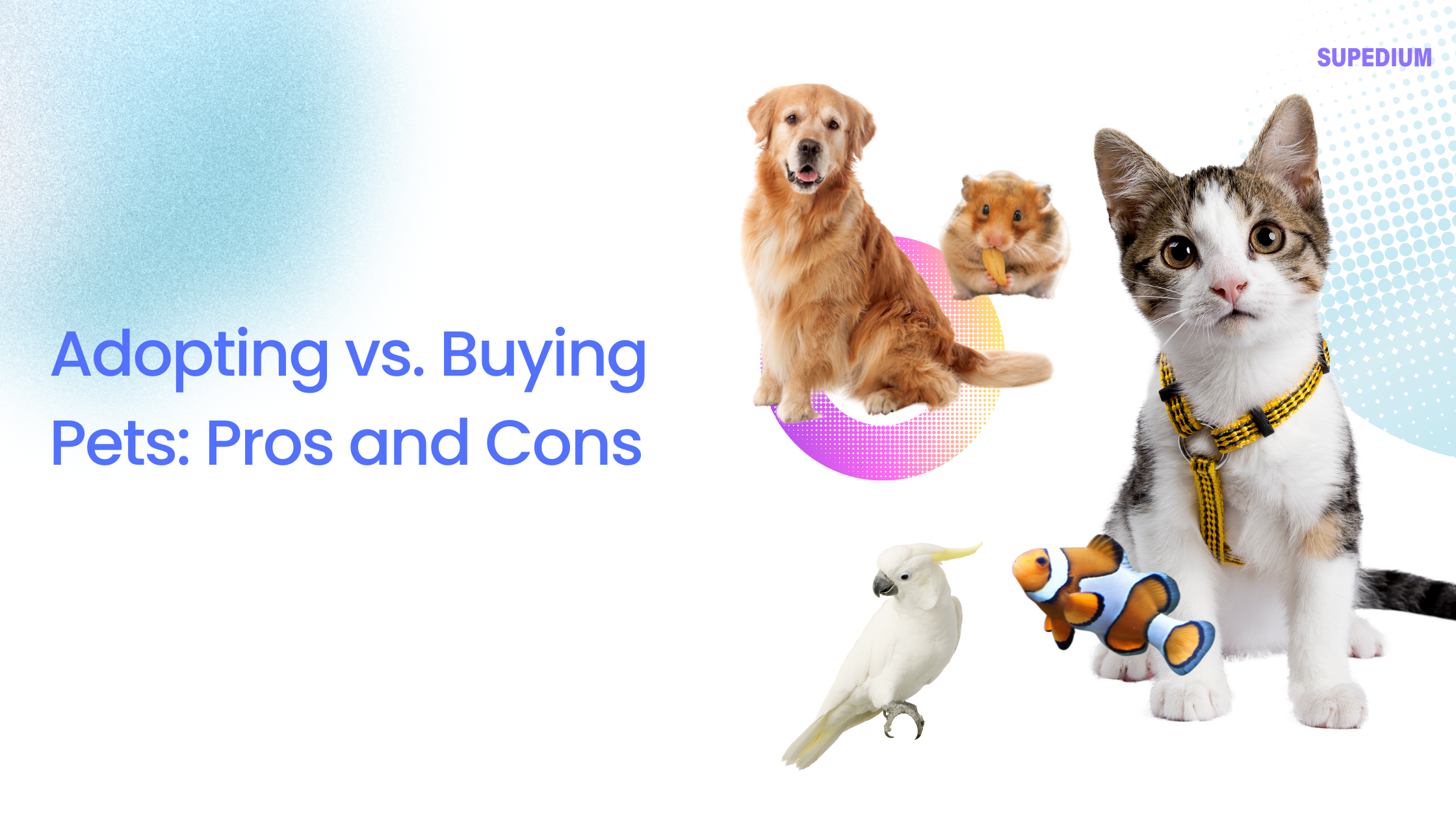![]()
When considering bringing a new pet into your home, you’ll encounter two primary routes: adopting from a shelter or rescue organization or buying from a breeder or pet store. Each option has its own set of advantages and drawbacks, which can significantly impact your decision. This article explores the pros and cons of adopting versus buying pets to help you make an informed choice that aligns with your values and circumstances.
I. Adopting Pets
Pros of Adoption
- Saving Lives Adopting a pet can make a substantial difference in reducing the number of animals in shelters and potentially lowering euthanasia rates. Many animals in shelters are in need of a second chance, and adopting them gives them an opportunity to find a loving home.
- Cost Efficiency Adoption fees are generally lower than the cost of purchasing a pet. Furthermore, many shelters include essential services in the adoption fee, such as spaying or neutering and initial vaccinations. This can reduce the immediate financial burden of pet ownership.
- Variety of Choices Shelters and rescue organizations often have a wide range of animals available for adoption, including various breeds, mixed breeds, and ages. This diversity allows potential pet owners to find a companion that fits their specific preferences and needs.
- Supporting Ethical Practices By adopting, you are supporting efforts against unethical breeding practices, such as puppy mills. Adoption also supports non-profit organizations that are dedicated to animal welfare and rescue, contributing to the broader mission of reducing pet overpopulation.
- Behavioral Benefits Many adopted pets come with a background history and behavior assessments. This information can be helpful in understanding the pet’s temperament and addressing any potential behavioral issues. Additionally, many shelter animals are already socialized and accustomed to living with people.
Cons of Adoption
- Uncertain History One of the challenges of adoption is the uncertainty surrounding an animal’s past. Shelter pets may come with unknown health histories or past traumas, which could affect their behavior and overall well-being. It’s important to be prepared for the possibility of dealing with these issues.
- Limited Choices Shelters may not always have the specific breed, age, or traits you are looking for. This limitation can be a disadvantage if you have a particular type of pet in mind or prefer a younger animal.
- Potential for a Longer Process The adoption process can sometimes be lengthy and involve several steps, such as filling out applications, undergoing home visits, and waiting for approval. This process is designed to ensure that animals are placed in suitable homes, but it can be time-consuming.
II. Buying Pets
Pros of Buying
- Predictability When purchasing from a breeder, you often receive a pet with a known lineage and health history. This predictability can be beneficial if you are seeking specific breed characteristics or want to avoid certain hereditary health issues.
- Immediate Availability Pets from breeders or pet stores are generally available for immediate adoption. This can be advantageous if you are looking to bring a pet home quickly or if you have specific breed requirements that might not be met through adoption.
- Breeder Support Reputable breeders often provide support and guidance throughout the pet’s life. This includes advice on training, health care, and nutrition, which can be a valuable resource for new pet owners.
Cons of Buying
- Cost The initial cost of purchasing a pet from a breeder or pet store is typically higher than adoption fees. Additionally, you may incur extra expenses for health checks, vaccinations, and other initial care needs.
- Ethical Concerns Buying pets from breeders, especially those operating under poor conditions, can contribute to unethical breeding practices. Puppy mills and irresponsible breeding operations are a concern, as they often prioritize profit over animal welfare.
- Health Risks Pets from breeders may be at risk for hereditary health issues, especially if the breeder does not adhere to ethical breeding practices. It’s crucial to research breeders thoroughly and ensure they maintain high standards of animal care.
III. Factors to Consider
Personal Preferences Your choice between adopting or buying a pet may depend on personal preferences, such as the desired breed, age, and temperament of the animal. Consider what characteristics are most important to you and how they align with the options available through adoption or purchasing.
Financial Considerations Evaluate the financial implications of both options. Adoption generally involves lower initial costs, but you should also consider long-term expenses for both adoption and purchase. Make sure you are prepared for the ongoing financial commitment of pet ownership.
Lifestyle and Living Situation Consider your living situation and lifestyle when choosing a pet. For example, some pets may require more space or have specific needs that align better with certain living environments. Make sure the pet you choose fits well with your daily routine and household dynamics.
IV. Conclusion
Choosing between adopting and buying a pet is a significant decision that involves various factors. Adoption offers the opportunity to save a life and support ethical practices, while buying from a breeder provides predictability and immediate availability. Both options come with their own set of advantages and challenges. Carefully consider your personal values, financial situation, and lifestyle needs to make the best choice for you and your future pet.
Share This





Be the first to comment